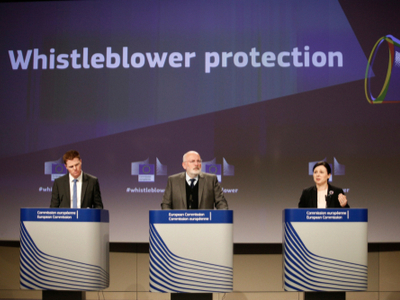
According to a survey by a national German newspaper, a large proportion of German whistleblowers are facing labor law and even health problems in connection with whistleblowing. 13 out of 20 whistleblowers subsequently lost their jobs.
To tackle these problems on EU level, the EU Commission has presented a draft directive, aimed at increasing the protection of whistleblowers in the EU. The target of this draft directive is to encourage whistleblowers to report abuses in the future. Whistleblowing is seen by the EU Commission as an effective instrument to avert major damage to the common good. At the same time, the higher standard of protection for whistleblowers should have a deterrent effect and contribute to the prevention of breaches of the law.
In concrete terms, a uniform and cross-border protection mechanism is to be created to protect whistleblowers from dismissals, degradation and other retaliatory measures and to ensure legal certainty and legal clarity in dealing with whistleblowers.
Three-Stage Process
The draft directive provides for a three-stage process for whistleblowers: First, whistleblowers must be able to report any (presumed) violations of the law internally. To this end, trustworthy communication channels must be created that guarantee secure handling of sensitive information, for example in the form of ombudsmen or hotlines. Only if there is no reaction to indications in this way should whistleblowers be able to contact state control authorities in a second step. Going public, e.g. via journalists and the media, should only be legitimized as an ultima ratio measure.
Scope of Protection
The draft rules apply to all companies with more than 50 employees or an annual turnover of at least ten million euros. In addition, all state and regional administrations and municipalities with more than 10,000 inhabitants are also included. At the same time, a substantive limitation to breaches of EU law in areas such as nuclear safety, financial services, money laundering and terrorist financing, public procurement, social assistance and health, consumer protection, product/transport safety, data protection, food/feed safety and environmental/animal protection was proposed. The new rules will also apply in cases of breaches of EU competition rules, corporate tax rules and damage to the EU’s financial interests.
The draft directive covers not only employees in the private sector. Rather, the purpose of the draft directive is to protect any person who may become aware of sensitive information. Consequently, public sector employees, contractors, suppliers, freelancers, unpaid interns, applicants and volunteers are also granted protection.
Burden of Proof
The Commission’s recommendations provide for a reversal of the burden of proof. In this case, the company concerned must prove that it has not taken any retaliatory measures against the whistleblower. Furthermore, the whistleblower should also be protected in court proceedings by the exemption from liability for disclosed information.
Outlook
The draft directive is initially only a recommendation of the EU Commission on the extended protection of whistleblowers. Before Member States have to implement these rules into national law, the agreement of the European Council, the Heads of State or Government, is still required. Nevertheless, it is already foreseeable that companies and authorities will have to deal with an internal whistleblower system and with protection mechanisms for whistleblowers in a timely manner. Not least by setting up and maintaining a whistleblower system and the associated data protection and labor law provisions, companies and authorities will have to shoulder additional administrative and financial costs.

